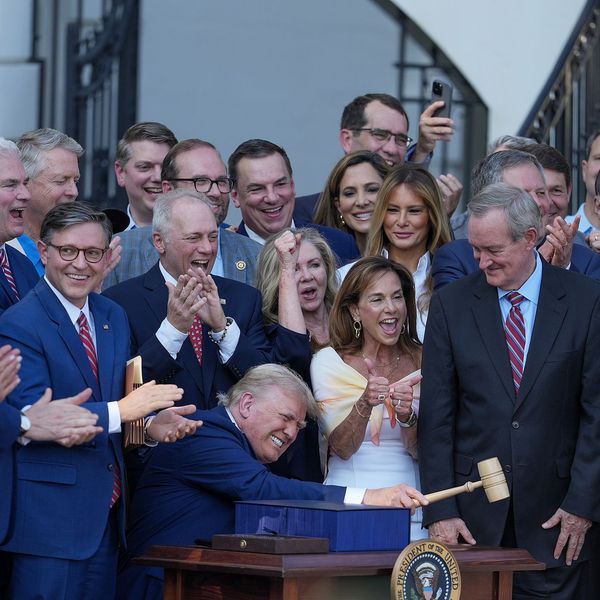In Era of Profits and Tax Shelters, Corporations Crusade (Again) for Lower Taxes
Despite huge cash reserves, healthy overseas growth and living in what the New York Times recently categorized as a "golden age of profits for corporations," the leaders of the Business Roundtable and other like-minded groups of Wall Street CEOs and business lobbyists are pushing (once again) to lower the corporate tax rate.
As The Hill reports, the corporate lobbyist group is preparing a national media blitz designed to "educate" Americans that everyone will somehow benefit if US companies are given a "home court advantage" by lowering tax rates and creating business-friendly rules about the flow of international profits.
According to the group's website, lowering the corporate tax rate to a flat 25% from its current 35% would spur "American job creation" and pave the way for "a healthy, growing economy."
But as various economists have explained over and over again, the unemployment problem in the US has nothing to do with a corporate tax rate that is too high. And the health of the economy is afflicted by rampant inequality, not unreasonable tax rates.
If anything, many suggest, corporations should be facing higher rates as a way to spur them to spend and generate additional revenue for a public sector that has suffered terribly since the bank bailouts that followed the housing collapse in 2008.
Corporations are doing better than ever. It is the historic low wages, a decimated public sector, and shallow confidence of consumers that has kept the economy in low gear.
From The Hill:
The Roundtable's new campaign is focused on the corporate tax system, though Engler also emphasized that his group was pushing for comprehensive tax reform, and was itself concerned by the tax rate hikes in the fiscal-cliff deal.
Other corporate coalitions, including the newly formed Let's Invest for Tomorrow America, or LIFT America, applauded the Roundtable's efforts.
The CEO group -- which says it will spend well into six figures on the campaign, using both print advertisements and digital outreach -- calls for reducing the top corporate tax rate from 35 percent to 25 percent, a marker that's also been laid down by Rep. Dave Camp (R-Mich.), the chairman of the House Ways and Means Committee.
Roundtable officials are also pressing for a revenue-neutral corporate reform, meaning the rewritten code wouldn't bring in more or less revenue than it did before, and the adoption of a modified territorial system, which would shield offshore corporate income from taxation.
_________________________________________
An Urgent Message From Our Co-Founder
Dear Common Dreams reader, The U.S. is on a fast track to authoritarianism like nothing I've ever seen. Meanwhile, corporate news outlets are utterly capitulating to Trump, twisting their coverage to avoid drawing his ire while lining up to stuff cash in his pockets. That's why I believe that Common Dreams is doing the best and most consequential reporting that we've ever done. Our small but mighty team is a progressive reporting powerhouse, covering the news every day that the corporate media never will. Our mission has always been simple: To inform. To inspire. And to ignite change for the common good. Now here's the key piece that I want all our readers to understand: None of this would be possible without your financial support. That's not just some fundraising cliche. It's the absolute and literal truth. We don't accept corporate advertising and never will. We don't have a paywall because we don't think people should be blocked from critical news based on their ability to pay. Everything we do is funded by the donations of readers like you. Will you donate now to help power the nonprofit, independent reporting of Common Dreams? Thank you for being a vital member of our community. Together, we can keep independent journalism alive when it’s needed most. - Craig Brown, Co-founder |
Despite huge cash reserves, healthy overseas growth and living in what the New York Times recently categorized as a "golden age of profits for corporations," the leaders of the Business Roundtable and other like-minded groups of Wall Street CEOs and business lobbyists are pushing (once again) to lower the corporate tax rate.
As The Hill reports, the corporate lobbyist group is preparing a national media blitz designed to "educate" Americans that everyone will somehow benefit if US companies are given a "home court advantage" by lowering tax rates and creating business-friendly rules about the flow of international profits.
According to the group's website, lowering the corporate tax rate to a flat 25% from its current 35% would spur "American job creation" and pave the way for "a healthy, growing economy."
But as various economists have explained over and over again, the unemployment problem in the US has nothing to do with a corporate tax rate that is too high. And the health of the economy is afflicted by rampant inequality, not unreasonable tax rates.
If anything, many suggest, corporations should be facing higher rates as a way to spur them to spend and generate additional revenue for a public sector that has suffered terribly since the bank bailouts that followed the housing collapse in 2008.
Corporations are doing better than ever. It is the historic low wages, a decimated public sector, and shallow confidence of consumers that has kept the economy in low gear.
From The Hill:
The Roundtable's new campaign is focused on the corporate tax system, though Engler also emphasized that his group was pushing for comprehensive tax reform, and was itself concerned by the tax rate hikes in the fiscal-cliff deal.
Other corporate coalitions, including the newly formed Let's Invest for Tomorrow America, or LIFT America, applauded the Roundtable's efforts.
The CEO group -- which says it will spend well into six figures on the campaign, using both print advertisements and digital outreach -- calls for reducing the top corporate tax rate from 35 percent to 25 percent, a marker that's also been laid down by Rep. Dave Camp (R-Mich.), the chairman of the House Ways and Means Committee.
Roundtable officials are also pressing for a revenue-neutral corporate reform, meaning the rewritten code wouldn't bring in more or less revenue than it did before, and the adoption of a modified territorial system, which would shield offshore corporate income from taxation.
_________________________________________
Despite huge cash reserves, healthy overseas growth and living in what the New York Times recently categorized as a "golden age of profits for corporations," the leaders of the Business Roundtable and other like-minded groups of Wall Street CEOs and business lobbyists are pushing (once again) to lower the corporate tax rate.
As The Hill reports, the corporate lobbyist group is preparing a national media blitz designed to "educate" Americans that everyone will somehow benefit if US companies are given a "home court advantage" by lowering tax rates and creating business-friendly rules about the flow of international profits.
According to the group's website, lowering the corporate tax rate to a flat 25% from its current 35% would spur "American job creation" and pave the way for "a healthy, growing economy."
But as various economists have explained over and over again, the unemployment problem in the US has nothing to do with a corporate tax rate that is too high. And the health of the economy is afflicted by rampant inequality, not unreasonable tax rates.
If anything, many suggest, corporations should be facing higher rates as a way to spur them to spend and generate additional revenue for a public sector that has suffered terribly since the bank bailouts that followed the housing collapse in 2008.
Corporations are doing better than ever. It is the historic low wages, a decimated public sector, and shallow confidence of consumers that has kept the economy in low gear.
From The Hill:
The Roundtable's new campaign is focused on the corporate tax system, though Engler also emphasized that his group was pushing for comprehensive tax reform, and was itself concerned by the tax rate hikes in the fiscal-cliff deal.
Other corporate coalitions, including the newly formed Let's Invest for Tomorrow America, or LIFT America, applauded the Roundtable's efforts.
The CEO group -- which says it will spend well into six figures on the campaign, using both print advertisements and digital outreach -- calls for reducing the top corporate tax rate from 35 percent to 25 percent, a marker that's also been laid down by Rep. Dave Camp (R-Mich.), the chairman of the House Ways and Means Committee.
Roundtable officials are also pressing for a revenue-neutral corporate reform, meaning the rewritten code wouldn't bring in more or less revenue than it did before, and the adoption of a modified territorial system, which would shield offshore corporate income from taxation.
_________________________________________

